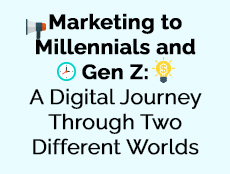A digital journey through two different worlds – the worlds of Millennials and Gen Z. Marketing to these two generations have become increasingly important in the digital age, where social media, mobile devices, and online platforms dominate everyone’s daily lives.

However, these two groups have unique characteristics, preferences, and behaviors that marketers must understand and cater to engage them effectively. In this blog, we’ll explore the digital landscapes of Millennials and Gen Z and provide insights on how to craft successful marketing strategies that resonate with each group.
So buckle up and get ready to dive into the fascinating marketing world of Millennials and Gen Z!
Who are Millennials?
People born roughly between the early 1980s and the mid-1990s are referred to as millennials, or Generation Y. This demographic group saw tremendous social, economic, and technical changes when they came of age at the turn of the century.
Millennials are sometimes called “digital natives,” having grown up with computers, mobile devices, and the internet. They are also well-known for being tech-savvy and intensely social media-connected. Millennials are regarded as one of the biggest and most prominent consumer groups, influencing politics, the economy, and culture.
Who is Gen Z?
The cohort known as Generation Z also referred to as post-millennials, encompasses individuals who were born from the mid-1990s to the early 2010s. The Generation Z generation comes after the millennials and before the generation that has yet to be named, sometimes known as Generation Alpha.
Gen Z’s are frequently described as pragmatic, technologically astute, diversified, and socially and ecologically sensitive. They were shaped by events like the Great Recession, the rise of social media, and the COVID-19 pandemic as they grew up in a world that was becoming more connected and digital.
Strategies for Marketing to Each Generation
Since each generation has distinct beliefs, tastes, and communication styles, marketing to each group requires a sophisticated and specialized strategy. Here are some general tips for selling to Millennials and Gen Z:
Marketing to Millennials
To reach the Millennial market, businesses must understand their interests, values, and desire to impact the world positively.
It is essential to recognize that every Millennial has unique priorities and passions. The millennial generation has a great desire to bring about positive change and is actively looking for ways to accomplish so.
Therefore, if you want to engage with this generation successfully, several effective marketing strategies should be considered. These may include:
1. Utilize the Influencers’ Power
Millennials trust recommendations from people they admire and follow online—partner with influencers who align with your brand and target audience to promote your products or services.
2. Create Content that Draws Attention
Millennials value experiences and enjoy interactive content that allows them to engage with brands meaningfully. Consider creating quizzes, polls, or other interactive content that is compatible with your brand and engages your audience.
3. Create Strategic Social Media Marketing
Millennials spend a lot of time on social media, making it a key platform for marketing. Develop a social media strategy that includes targeted ads, engaging content, and influencer partnerships to reach your Millennial audience.
4. Put Yourself in Customer Shoes
Millennials respond well to personalized experiences tailored to their interests and preferences. Consider offering customized recommendations, custom products, or exclusive offers to engage this audience.
5. Social Responsibility for Longevity
As a socially conscious generation, Millennials value brands committed to social responsibility. Highlight your company’s sustainability efforts, social impact, and diversity initiatives to appeal to this audience.
Marketing to Gen Z
The birth years that define Generation Z remain a subject of debate, but most commonly, they are considered to be those born between the late 1990s and the early 2010s. This age group currently comprises teenagers and young adults.
Generational distinctions are typically designated by alphabetical letters, except for Millennials. However, the naming convention resumes with Generation Z.
1. Unleash the Power of Short-Form Video Marketing
Gen Z prefers short-form video content that is engaging and visually stimulating. Consider using platforms like TikTok or Instagram Reels to create short, attention-grabbing videos that align with your brand and target audience.
2. Inspiring and Engaging Content Worth Sharing
Gen Z is highly social and values shareable content and encourages engagement. Develop visually striking, emotionally resonant, and shareable content to help your brand gain traction on social media.
3. Maximize Influencer Impact
Gen Z trusts social media influencers and values their recommendations—partner with influencers who align with your brand and audience to reach this demographic.
4. Mobile Driven Marketing
Gen Z is highly mobile-focused and prefers to engage with brands through mobile devices. Ensure your website and marketing content are optimized for mobile, with fast load times, easy navigation, and a mobile-friendly design.
5. Emphasize your Brand Values
As a socially conscious generation, Gen Z values brands that align with their values and beliefs. Highlight your company’s sustainability efforts, social impact, and diversity initiatives to connect with this audience.
Conclusion
Marketing to Generation Z and Millennials requires a tailored approach considering each generation’s unique characteristics and preferences. While both generations share some similarities, such as a preference for social media and a desire for authenticity and transparency from brands, there are also critical differences in their values, communication styles, and media consumption habits.
By understanding these differences and implementing targeted marketing strategies, businesses can effectively engage with both generations and build lasting customer relationships. Ultimately, the key to successful marketing to Gen Z and Millennials is to stay adaptable, authentic, and focused on delivering value to your target audience. Shall we start the value-driven process?

